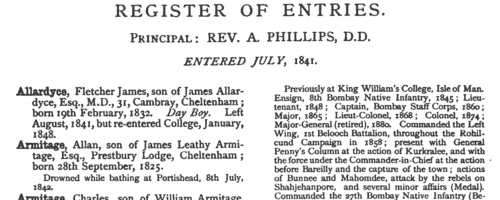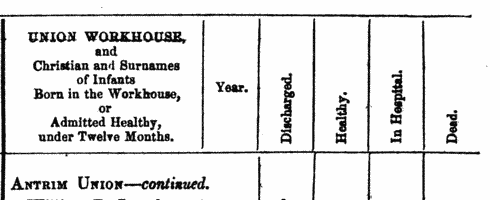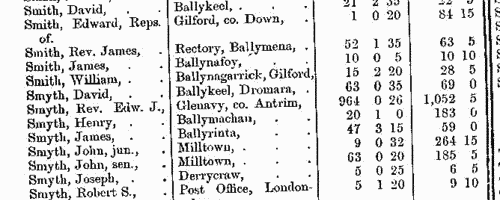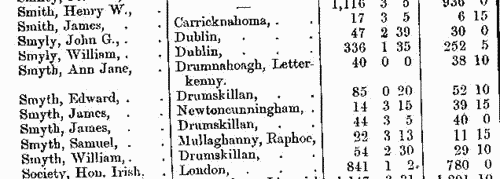Gilliland Surname Ancestry ResultsOur indexes 1000-1999 include entries for the spelling 'gilliland'. In the period you have requested, we have the following 59 records (displaying 11 to 20): Single Surname Subscription | | | Buying all 59 results of this search individually would cost £316.00. But you can have free access to all 59 records for a year, to view, to save and print, for £100. Save £216.00. More... |
These sample scans are from the original record. You will get scans of the full pages or articles where the surname you searched for has been found. Your web browser may prevent the sample windows from opening; in this case please change your browser settings to allow pop-up windows from this site.  Royal Artillery fighting in China
(1856-1860) Royal Artillery fighting in China
(1856-1860)
The China Medal was awarded to soldiers and sailors who took part in the prosecution of the war against the Chinese from 1856 to 1860. Separate clasps were awarded for men who had been in receipt of the China Medal of 1842; for being actually present at Canton on 28 and 29 December 1857, when that city was bombarded and finally captured; for being actually engaged in the operations which ceased with the first capture of the Taku Forts, 20 May 1858, and led to the Treaty of Tientsin; for being actually present at the capture of the Taku Forts 21 August 1860; and for being actually present before Pekin the day the gate of that city was given up to the allied (British and French) army, viz. on 13 October 1860. Several batteries of the Royal Artillery took part in these actions.GILLILAND. Cost: £8.00.  | Sample scan, click to enlarge

| Science Schools and Classes: Elementary Examination: Class Lists
(1869)
The Science and Art Department of the Committee of Council on Education published these class lists giving the names of all the successful candidates in the examination of science schools and classes taken in May 1869. The candidates were of three levels: honours; second stage or advanced examination; third stage or elementary examination. Twenty-three subjects were offered. These are the lists for the elementary examination. The tables, arranged subject by subject, give the candidate's full name (surname first), age, and occupation - or, in the case of those not yet of working age, father's occupation, preceded by (f.). Many candidates sat and were successful in more than one subject, and so appear in more than one list. The subjects are: I. Practical, Plane and Solid Geometry; II. Machine Construction; III. Building Construction; IV. Elementary Mathematics; V. Higher Mathematics; VI. Theoretical Mechanics; VII. Applied Mechanics; VIII. Acoustics, Light, and Heat: IX. Magnetism and Electricity; X. Inorganic Chemistry; XI. Organic Chemistry; XII. Geology; XIII. Mineralogy; XIV. Animal Physiology; XV. Zoology; XVI. Vegetable Anatomy and Physiology; XVII. Systematic and Economic Botany; XVIII. Mining; XIX. Metallurgy; XX. Navigation; XXI. Nautical Astronomy; XXII. Steam; XXIII. Physical Geography. GILLILAND. Cost: £6.00.  | Sample scan, click to enlarge

|  Men of the 3rd Waikato Regiment who served in the New Zealand War
(1861-1870) Men of the 3rd Waikato Regiment who served in the New Zealand War
(1861-1870)
New Zealand War Medal roll for members of the 3rd Waikato Regiment who volunteered for service in the Imperial Commissariat Transport Corps in the New Zealand campaign 1861 to 1866: the rolls were compiled following a general order in 1869 and the medals were distributed in 1870.GILLILAND. Cost: £8.00.  | Sample scan, click to enlarge

|  Men of the East Suffolk regiment who fought in the New Zealand War
(1863-1870) Men of the East Suffolk regiment who fought in the New Zealand War
(1863-1870)
New Zealand War Medal roll for the 12th (East Suffolk) Regiment of Foot: for service in the New Zealand campaign 1863 to 1867: the rolls were compiled following a general order in 1869 and the medals were distributed in 1870. The 1st battalion, based at Bury St Edmunds, embarked for Australia 1 July 1854, served in Tasmania, and was moved to New Zealand in 1863; the men returned to England in 1867.GILLILAND. Cost: £8.00.  | Sample scan, click to enlarge

| Boys entering Cheltenham College
(1870)
Cheltenham College 'was founded in order to provide for the sons of gentlemen a Classical, Mathematical, and General Education of the highest order, on moderate terms, in strict conformity with the principles and doctrines of the Church of England.'
Andrew Alexander Hunter, the college registrar, compiled the first edition of the College Register in four parts from 1883 to 1886: these merely listed the boys by term of entry, with their dates of birth and names and addresses of their fathers. Circulars were also sent out to all Old Cheltonians whose addresses were known, requesting additional details. On the basis of the returns from these and Hunter's further researches, this much fuller register was published in 1890.
The information after each boy's name is given (where known and applicable) in this format: father's full name and address as of the time the boy entered the college; class and department on entering the college (classes being number from 1 downwards, and these again divided into A and B, some into C and D, others into P (Principal's side) and V. P. (Vice-Principal's side) - 1A was the highest class in each department: besides this, certain others were called Addiscombe, Woolwich, Civil, Direct, Line, Sandhurst, Naval, Special, Preparatory, Latin, and India Civil) and the same on leaving, name of Boarding House (or 'Day Boy'), scholastic and athletic honours attained at the college, and subsequent career (including date and place of death, or present address in 1890, if known).GILLILAND. Cost: £4.00.  | Sample scan, click to enlarge

| Infants in Newtownards Workhouse, County Down
(1873)
Return, “with Christian and Surname of each, of Infants Born in Irish Workhouses, or Admitted thereto when Healthy under Twelve Months Old, and attempted to be Reared therein during the Years 1872 to 1874, showing what has since become of them”. The returns from each poor law union workhouse give: Christian and Surname of Infant Born in the Workhouse, or Admitted Healthy, under Twelve Months; Year; and whether discharged, healthy, in hospital, or dead.
GILLILAND. Cost: £6.00.  | Sample scan, click to enlarge

| Freeholders in county Carlow
(1873-1875)
Owners of an acre or more, whether resident there or elsewhere: with their addresses; the acreage; and a valuation of the land. The survey commenced in February 1873, the last returns being received in November 1875.GILLILAND. Cost: £4.00.  | Sample scan, click to enlarge

| Freeholders in county Carlow
(1873-1875)
Owners of an acre or more, whether resident there or elsewhere: with their addresses; the acreage; and a valuation of the land. The survey commenced in February 1873, the last returns being received in November 1875.GILLILAND. Cost: £4.00.  | Sample scan, click to enlarge

| Mathematics students at Cambridge University
(1877)
Tripos lists or examination results for the year, arranged by class (Wranglers, Senior Optimes and Junior Optimes), and within each class in order of score in the examination (the names of candidates with equal scores are bracketed together, with the word 'AEq.'). Each student's surname and college is given: this list was printed in 1890, and was annotated with asterisks to show which students had subsequently become fellows of the university; and with footnotes showing those who became headmasters, &c., elsewhere. Winners of Dr Smith's Mathematical Prizes are marked (1) senior, (2) for junior. The Greek letter alpha is affixed to the names of those students who had gained first class results in the Classical Tripos; beta to those entered in the second class; and gamma to those entered in the third class. These lists are particularly useful in identifying for an individual the fellow-students who will have attended lectures with him; and, where from the college, are likely to have been even more closely associated by having been under the same supervisor. (The sample scan is from the start of the Mathematics Tripos list for 1770)GILLILAND. Cost: £6.00.  | Sample scan, click to enlarge

| Elementary Teachers in Liverpool
(1880)
The National Union of Elementary Teachers, established in 1870, brought together members of the profession throughout England and Wales, organized in local Teachers' Associations. Lists of members of the associations were printed in the annual reports. Each association's officers are listed first, then the ordinary members. Surnames are given, Mr/Mrs/Miss, initial(s), and the name of the school - B. S., British School; Bd. S., Board School; Congl. S., Congregational School; End. S., Endowed School; Gr. S., Grammar School; N. S., National School; Par. S., Parochial School; Pres. S., Presbyterian School; R. C. S., Roman Catholic School; Undl. S., Undenominational School; W. S., Wesleyan School.GILLILAND. Cost: £6.00.  | Sample scan, click to enlarge

|
Research your ancestry, family history, genealogy and one-name study by direct access to original records and archives indexed by surname.
|













